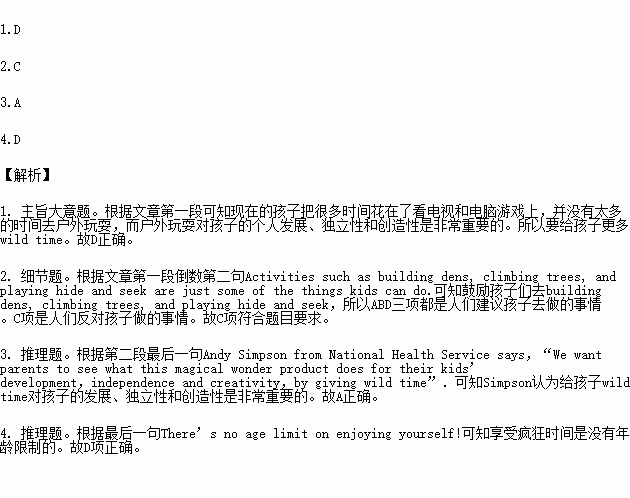题目内容
阅读下列四篇短文,从每小题后所给的A、B、C、D四个选项中,选出最佳选项,并在答题卡上将该选项涂黑。
Today,we are told,children don’t spend enough time in the fresh air.Many of them are addicted to a screen either on a computer or a TV—they seem to be living in a virtual world.They have lost touch with nature.But now 400 organizations in the UK,from playgroups to the National Health Service,are encouraging children to have some “wild time”.They want kids to exchange at least 30 minutes of watching TV or playing computer games for time to play outside.Activities such as building dens, climbing trees, and playing hide and seek are just some of the things kids can do. Even if they live in a city,they can go on adventures in the garden or the park.
Children often need a helping hand from mum and dad.They need to be shown what to do and where to go.Andy Simpson from National Health Service says,“We want parents to see what this magical wonder product does for their kids’ development,independence and creativity,by giving wild time”.
So in spite of the complicated world that young people grow up in now,it seems that going back to basics and experiencing “nature’s playground” is what modern children need.David Bond from Project Wild Thing says,“We need to make more space for wild time in children’s daily routine,freeing this generation of kids to have the sort of experiences that many of us took for granted”.
This might sound a bit old fashioned to you or maybe,like me,and it has made you think about putting on your boots, getting outdoors and recalling your childhood.There’s no age limit on enjoying yourself!
1.What is the best title of the text?
A. Adventures of children
B. Kinds of wild time
C. More space for children
D. Wild time for children
2.Children are encouraged to do the following activities except .
A. building dens B. climbing trees
C. watching TV D. playing hide and seek
3.According to Andy Simpson,we know that .
A. wild time is good for children
B. wild time is hard to design
C. parents know the importance of wild time
D. parents like keeping their children indoors
4. What can be inferred from the last paragraph?
A. People like recalling the past.
B. It is out of date to go outdoors.
C. It is too late for adults to enjoy nature.
D. People at any age can enjoy wild time.

